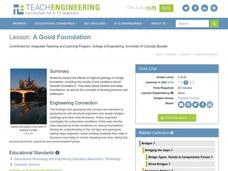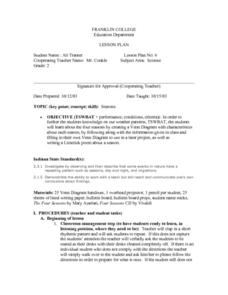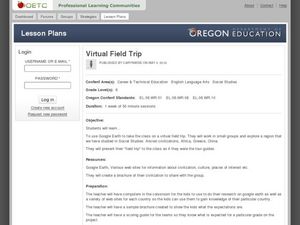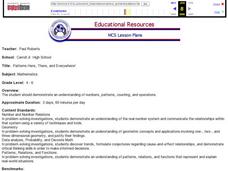National Wildlife Federation
Who Can Live Here?
Not all species can survive in all habitats. Using specific criteria, learners assess the fitness of a local habitat to a specific species. They collect data and suggest enhancements to create a suitable habitat for their chosen species.
American Statistical Association
Spinners at the School Carnival (Equal Sections)
Spin to win a toy car. A fun activity has pupils use a spinner in which three of the equal sections represent winning a toy car, and the fourth section represents no car. They record the number of wins after certain numbers of spins,...
WindWise Education
Which Blades Are Best?
If I change the length, will they work better? After brainstorming the variables of wind turbine blade design, groups choose one variable to isolate and test. The groups then present their data to the class in order for all to have the...
Teach Engineering
A Good Foundation
It takes a strong foundation to build a house and a stronger one for a bridge. This resource presents the effects of geology and soil on bridge foundations. Working in groups, the class investigates the interaction of shallow and deep...
Mathematics Assessment Project
Middle School Mathematics Test 4
Raise expectations in your classroom and assess learners through the provided performance tasks. Class members must apply concepts learned throughout the year, providing a good measurement of how well they understand the...
abcteach
Community Walk
Invite your pupils to explore their surroundings with a walk around the neighborhood. Learners use their senses to make observations about their surroundings.
Teach Engineering
How Effective is Your Sunscreen?
Protect skin from UV radiation! Groups design and conduct an experiment to test the effectiveness of UV safety products. The groups collect the data from the experiment and prepare a lab report. In the second day of the activity,...
101 Questions
Super Bear
Bear with your classes as they explore unit rate and proportions using gummies! Gummy bears come in many different sizes, including a 2,250-gram super bear! The task asks learners to determine how many regular bears and how many mini...
Curated OER
Biography Worksheet
The design of good graphic organizers indicate the relative importance of the information collected. This biography graphic organizer is a good one because the focus is more on events in the subject's life, the whys and whats, rather...
Teach Engineering
Projections and Coordinates: Turning a 3D Earth into Flatlands
Introduce your class to map projections and coordinates, the basics for the work done in a GIS, with an activity that uses Google Earth to challenge learners to think about the earth's shape.
Mathematics Vision Project
Module 4: Polynomial Functions
Bridge the gap between graphical and algebraic representations. Learners complete six lessons that begin by pointing out connections between the key features of a polynomial graph and its algebraic function. Later, pupils use the...
Curated OER
Squares in the Light
Students collect and analyze data using a graph. In this algebra lesson, students explain their findings orally and with a graph. They use their knowledge to solve real life scenarios.
Curated OER
Weather Patterns
Fourth graders collect and chart weather data over the course of the school year either using tools at school or media resources. They agree on weather terms to use in their observations and write them on the assigned sheet. Finally,...
Curated OER
Walking on Air
Students collect and analyze data with a graph. In this statistics lesson, students use central tendencies to find the meaning of their data. They display the data on a Ti calculator.
Curated OER
How High Are the Clouds?
Students analyze height and collect data to create a graph. In this statistics lesson, students use central tendencies to analyze their data and make predictions. They apply concept of statistics to other areas of academics to make a...
Curated OER
Magnetic Discovery Bottle
Students investigate the properties of magnets. In this physical science lesson plan, students will go through a short 5E instructional activity that allows the students to study magnet materials and predict what will and will not...
Curated OER
Virtual Field Trip
This hands-on resource has future trip planners analyze graphs of mileage, gasoline costs, and travel time on different routes. While this was originally designed for a problem-solving exercise using a Michigan map, it could be used as a...
Curated OER
Patterns Here, There and Everywhere
Pattern recognition is a skill often used in mathematics. Learners count and sort manipulatives, organize the data into a graph and answer questions about the information displayed. They collect the objects to be used and create patterns...
Curated OER
The Wetlands
Complete a comparison of the wetlands found in New York and Louisiana. Using various research methods, gather data on the wetlands found in New York and Louisiana, the animals, conditions, etc. Data is used to create a brief report on...
John Talavera
Autism iHelp – Sorting
Here is an app that will help kids sort objects! Sorting is an action that promotes cognitive flexibility and executive function. It is a key skill used in categorizing scientific data, making generalizations, and is foundational in...
American Physiological Society
An Inquiry into Alcoholic Fermentation
Introduce life science students to their new "best buds" yeast! Using a wide variety of materials, lab groups design an experiment that illustrates how yeast acquires the resources it needs to undergo cellular respiration. The teacher's...
Curated OER
Funerals and Burial Rites
Ninth graders research burial practices that originated in West Africa and then migrated to the South Carolina and Ohio. They compare and contrast burial practices in both places. As students collect information and data, they organize...
Curated OER
Becoming A Career Detective (Part 2)
Third graders review and expand their discussion of job training and education resources. They work in small groups to find information about the types of training people need to do specific jobs and use data from interviews carried out...
Curated OER
Fast Food Survey Using Bar Graphs
Second graders create a bar graph to pictorically represent the data collected from a survey of students. They use Excel to electronically create the graphs and data tallies. They then interpret their data using sentences to explain.

























